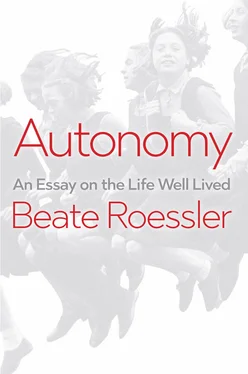What I am primarily interested in pursuing in the following chapters, however, is the problem of individual autonomy in everyday life, the side of individual experience and individual capability. We can call this an ethical question as it concerns the possibility of leading an autonomous, well-lived life. I use the term “ethics” here in the broad (Aristotelian) sense that Bernard Williams and others have refamiliarized us with, which deals with questions not only of morality but also of the good life. In later chapters, however, I will also take into account the social and political side of autonomy, which shows how the idea of personal autonomy both is made possible and at the same time can be threatened by social and political conditions.
At this point, I should briefly introduce the various perspectives that I will take up in this book regarding the problem of autonomy. How is the idea of autonomy to be understood, and what tradition is it a part of? In chapter 1, I want to address conceptual issues and elucidate in what sense autonomy is related to individual freedom, what capacities we should ascribe to an autonomous person, and what the limiting cases of such ascriptions are. We will also see that we are only ever autonomous together with others.
Are autonomous action and autonomous reflection necessarily free of any ambivalence ? Must an autonomous person always be able to say, “Here I stand, I can do no other”? I consider the problem of the ambivalent person in chapter 2, in which I hope to make clear that ambivalence is by no means always a threat to our autonomy. On the contrary, it is a natural part of our self-determined – and rational – everyday life.
In chapter 3, I ask why autonomy is in fact so valuable and important. I pose this question as the question of the relationship between autonomy and the meaning of life . Is a life meaningful only if it is autonomous? And can it be meaningful – and autonomous – without being happy? Must it be objectively meaningful, or is it enough if it can be understood as autonomous and subjectively meaningful? Here again, I shall draw on literary examples in order to better understand these tensions or contradictions and to demonstrate the constitutive connection between self-determination and meaning in one’s own life.
Persons who act autonomously know what they think and know what they want. That is, in order for individuals to be able to act and live autonomously, they must know themselves. But how – after Freud – can we demand self-transparency as a condition of autonomy? Chapter 4considers the question of what form of self-awareness and self-knowledge we can reasonably attribute to an autonomous person, given the widespread phenomenon of self-deception. I also discuss whether or not new “self-tracking technologies” are in fact capable of contributing to self-knowledge and thus promoting autonomy.
I take up a different perspective on the tensions in our autonomously lived everyday lives in chapter 5. In the course of interpreting selected passages from various diaries and blogs, I investigate whether the process of reflection that I earlier described as characteristic of autonomy can be found in such writings in exemplary form. If we accept the premise that at least the classic diary is a paradigmatic space of everyday confrontation with one’s own life, then such accounts should be able to help us show what autonomy actually means in everyday life. And looking at modern blogs and vlogs, we can further ask whether this form of confronting one’s own autonomy has changed within and through these new media.
The focus of chapter 6is the question of the relation between autonomy and the good life . Is post-Kantian moral philosophy capable of developing a substantive theory of the good life at all? Is it ethically defensible to create standards to judge whether a life is good or well lived? With the aid of the concept of alienation and an analysis of why it is that autonomous choice is so critical for the good, autonomous life, I want to probe whether we can make critical statements about the good life without at the same time casting doubt on the autonomy of those who have chosen it or in any case live it.
Chapter 7, on the relation between autonomy and privacy , concerns the ethical as well as the political question of the necessity of protecting individual privacy if living an autonomous life is to be possible. I would like to consider the question of why a free, autonomous – and well-lived – life is dependent on the protection of privacy, and why we cannot and do not want to imagine a life lived only in the public sphere. Why would a society where privacy was no longer respected be suffocating and unfree?
In chapter 8, I discuss more generally the necessary preconditions of individual autonomy, the political and social conditions that are required if one is to be able to live an autonomous life. My focus here is the relation between individual autonomy and the conditions associated with a liberal-democratic social order. I want to show that there is no necessary, direct connection between these liberal-democratic prerequisites and the possibility of an autonomous life. One important question in this context is how to best analyze the dual nature or Janus-faced character of social conditions that are capable of both enabling and structurally impeding autonomy. Here I will therefore also discuss the problems of structural oppression and discrimination as well as the question of whether people with “false consciousness” or “adaptive preferences” can be considered autonomous.
I said at the outset that in western liberal societies we take it to be self-evident that we can live autonomously. In chapter 9, at the end of our journey through the many tensions of the autonomously lived everyday life and the difficulties of achieving a life well lived, I defend my argument for the idea of autonomy by spelling out the self-understanding of such a notion against those critics who deem neither free will nor personal autonomy – nor moral responsibility – to even be possible. I shall not refute these theories, but I want to show what the price of denying the possibility of autonomy would be. Since throughout this book I take autonomy to be possible at least in principle, it will be useful to conclude with an attempt to defend the reality of autonomy one last time against this fundamental skepticism.
The different topics covered in these chapters each require a different approach. Some must be discussed against the backdrop of recent, at times rather complicated, philosophical debates; this is less the case for other questions, such as how to interpret autonomy in diaries. Writing about the autonomous life means at the same time writing about the possibility of a life well lived. This is my thesis, which I seek to substantiate sometimes explicitly, but for the most part implicitly, in the ensuing chapters. In the process, I define autonomy as a necessary but not sufficient condition of a life well lived. And I shall not begin by outlining a specific theory of autonomy or of the well-lived life that I then apply to everyday situations in order to see whether we are in fact autonomous here. I instead take the opposite path, offering only a general clarification of concepts before looking at different problems and contexts involving autonomy along with the various ways in which autonomy can fail. Along the way, a theory of personal autonomy in fact emerges, but in a sense surreptitiously. I would like to close with a remark on terminology: I speak of a “life well lived” only when it is not merely autonomous but also meaningful and happy. 9Philosophical texts tend to speak primarily of the good life – and the pursuit of the good life as a happy life. I opt not to use this terminology because the good life (at least in the literature) can also be one that is not self-determined, and it is important to me to make clear this potential difference between the good life and a life well lived. To complicate the matter a bit further: a life can be meaningful, but not happy, as meaning is more in our own hands than happiness is. And young children, for example, can have a good, happy life that is, however, not self-determined and, because it has not yet been reflected upon, not meaningful (although it certainly is for others). This will all become clear in the course of the chapters that follow.
Читать дальше












